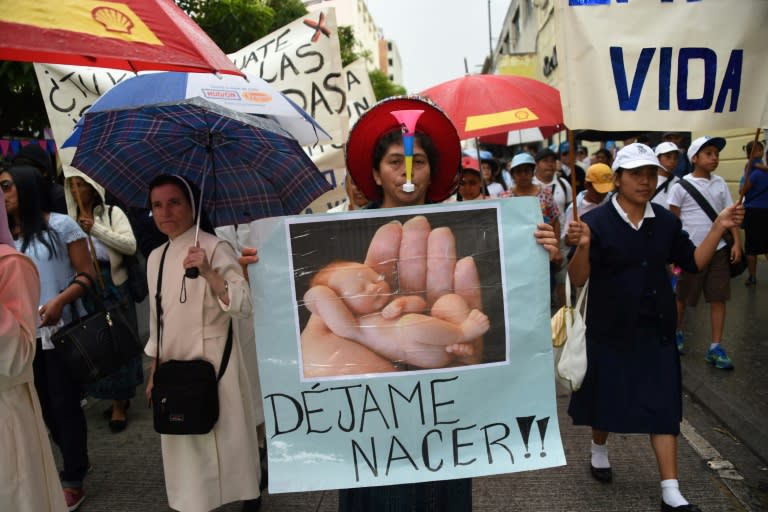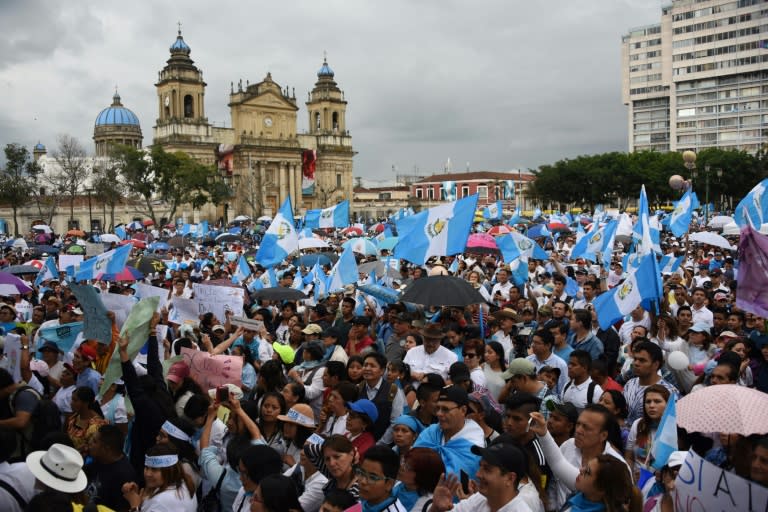Women's groups drop Guatemala abortion clause over church dissent
Women's rights activists were forced into a hasty retreat Tuesday in the face of fierce church-led opposition to proposed legislation to loosen strict abortion laws. Sponsors of the bill aimed at protecting underage victims of sexual abuse opted to remove a controversial clause that would decriminalize abortion for girls aged 14 or under who have been abused. The influential Catholic and Evangelical churches organized a massive rally on Sunday to protest against the bill and in support of "life and the family." "Taking into account the different positions, we prefer prioritizing" caring for the girls, Women Transforming the World activist Paula Barrios told AFP. "We're not ready to talk about" abortion in Guatemala, she added. After a bill decriminalizing abortion made it through Argentina's lower house before being defeated in the upper house last month, the subject has become a hot topic in Latin America. Other countries are either debating or mulling proposed changes to their usually strict abortion laws, such as Chile, which is considering universally allowing abortion in the first 14 weeks of pregnancy, or Brazil, which is weighing legalization in the first 12 weeks. - Abortion totally banned - But Central America is generally the most conservative in the region when it comes to terminating pregnancies. Abortion is totally banned in El Salvador, Honduras and Nicaragua. In Guatemala, it is authorized only when there is a threat to the mother's life. On Sunday, 20,000 protesters, backed by the Catholic and Evangelical churches, took to the streets to oppose the bill sponsored by the leftist Convergencia opposition party. The bill "was never an abortion law, it was always a law about caring for girls," said Convergencia deputy Sandra Moran. It aims to provide social and educational support for girls who become pregnant because in Guatemala they are expelled from school for doing so. Without the abortion clause, it is likely to be adopted by parliament. However, a second bill proposed by right-wing opposition senator, Fernando Linares, aiming to increase punishments for abortion, will be debated by congress. His "Life and Family Protection" bill proposes an increase in the punishment for intentional abortion from one to three years to five to 10 years. Most controversially, though, it proposes sentences of two to four years for attempted and "negligent" abortion. The measure has been widely denounced by feminist groups fearful it would criminalize miscarriages. "It's a setback to the rights women have won," said Ada Valenzuela from the National Union of Guatemalan Women. Jose Miguel Vivanco, Americas director at Human Rights Watch (HRW), says Linares's "bill could lead to absurd and discriminatory outcomes." "A woman recovering from a miscarriage could find herself interrogated by law enforcement about the loss of her pregnancy," he added. An HRW article on the subject last week quoted a study that claims that up to 30 percent of pregnancies end in early-term miscarriages, while at least 10 percent of clinically recognized pregnancies end in spontaneous abortion (miscarriage). - 'Second-class citizens' - Women are not alone in worrying about the consequences of the Linares bill, which also aims to change laws relating to the LGBT community. It expressly prohibits same-sex marriage and defines family as being limited to a father, mother and children. The bill also defines marriage as between people who are men and women by birth, potentially discriminating against the transgender community. "If Congress passes this bill, it will send the message that women and LGBT people are second-class citizens in Guatemala," said Vivanco. "The proposal lacks basic common sense and humanity and could even turn women and girls who miscarry into criminals."




